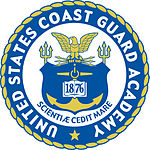U.S. Coast Guard Academy
 |
|
|
Former names
|
Revenue Cutter Service School of Instruction (1876) |
|---|---|
| Motto | Scientiæ Cedit Mare (Latin) |
|
Motto in English
|
The sea yields to knowledge |
| Type | U.S. Service Academy |
| Established | 1876 |
| Superintendent | Rear Admiral James E. Rendon (USCGA 1983) |
| Dean | Capt. (ret.) Kurt J. Colella |
| Commandant | Capt. Melissa L. Rivera (USCGA 1991) |
|
Academic staff
|
130 |
| Students | 896 cadets (as of September 2014) |
| Location |
New London, Connecticut, U.S. 41°22′22″N 72°06′06″W / 41.37278°N 72.10167°W |
| Campus | Suburban – 110 acres (44.5 ha) |
| Fight song | "Semper Paratus" |
| Colors | Blue and Orange |
| Athletics | NCAA Division III - NEWMAC NEFC |
| Sports | 26 varsity sports teams (14 men's and 12 women's) |
| Nickname | Bears |
| Mascot | Objee the Bear |
| Website | www.uscga.edu |
Founded in 1876, the United States Coast Guard Academy (USCGA) is the service academy of the United States Coast Guard. Located in New London, Connecticut, it is the smallest of the five federal service academies. The academy provides education to future Coast Guard officers in one of eight major fields of study.
Unlike the other service academies, admission to the academy does not require a congressional nomination. Students are officers-in-training and are referred to as cadets. Tuition for cadets is fully funded by the Coast Guard in exchange for an obligation of five years active duty service upon graduation. This obligation increases if the cadet chooses to go to flight school or graduate school. Approximately 250 cadets enter the academy each summer with about 200 cadets graduating. Graduates are commissioned as ensigns. The academic program grants a Bachelor of Science degree in one of eight majors, with a curriculum that grades cadets' performance upon a holistic education of academics, physical fitness, character and leadership. Cadets are required to adhere to the academy's "Honor Concept," "Who lives here reveres honor, honors duty," which is emblazoned in the halls of the academy's entrance.
The academy's motto is Scientiæ cedit mare, which is Latin for "the sea yields to knowledge" (the trident, emblem of the Roman god Neptune, represents seapower).
The Academy is accredited by the New England Association of Schools and Colleges, ABET, and AACSB for its various programs.·
The roots of the academy lie in the School of Instruction of the Revenue Cutter Service, the school of the Revenue Cutter Service. Established near New Bedford, Massachusetts in 1876, the School of Instruction used the USRC Dobbin for its exercises. Captain John Henriques served as superintendent from founding until 1883. The one civilian instructor was Professor Edwin Emery, who taught mathematics, astronomy, English composition, French, physics, theoretical steam engineering, history, international law, and revenue law, among other subjects. The School was, in essence, a two-year apprenticeship, supplemented by minimal classroom work. The student body averaged five to ten cadets per class. With changes to new training vessels, the school moved to Curtis Bay, Maryland, in 1900 and again in 1910 to Fort Trumbull, a Revolutionary War–era Army installation near New London, Connecticut. In 1914 the school became the Revenue Cutter Academy, and with the 1915 merger of the Revenue Cutter Service and the Life Saving Service, it became the Coast Guard Academy.
...
Wikipedia
